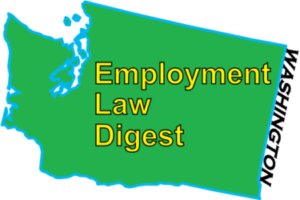This is a case summary of Chen v. State, 86 Wn.App. 183 (Div. 2 1997), review denied, 133 Wn.2d 1020, 948 P.2d 387 (1997). The subjects addressed herein include the following:
» FRAUD
» MOTIONS FOR RECONSIDERATION
» PROMISSORY ESTOPPEL
» SELF-EVALUATIONS
» THE MCDONNELL DOUGLAS FRAMEWORK — PRETEXT
» WRONGFUL TERMINATION
In this case, “Western State Hospital dismissed Dr. Hsi Chen after a six-month probationary period, citing poor performance. Chen sued, alleging
(1) fraud based on his reliance on the State’s representations about the probationary employment period, and
(2) discrimination.
Id. at 185 (paragraph formatting added). “The trial court granted summary judgment for the State, and Chen appeal[ed]. Because the State did not misrepresent the conditions of probation, and because Chen failed to produce evidence that the State’s reason for dismissing him was false or a mere pretext, we affirm.” Id. at 185-86.
IMPORTANT: This article is for informational purposes only and is based upon my point of view. This is not a resource for the actual and complete appellate court opinion. Due to the rapidly changing nature of the law, we make no warranty or guarantee concerning the accuracy or reliability of the content in this article. No content on this site, regardless of date, should ever be used as a substitute for direct legal advice from your attorney. Please review our Disclaimer|Terms of Use|Privacy Policy before proceeding.

case summarY – 19 PRIMARY Facts:
[1] Hsi Chen was born in Taiwan in 1925 and received his medical degree there in 1948.
[2] He became board certified in psychiatry in the United States in November 1989.
[3] The following spring, Chen applied for a psychiatrist position at Western State Hospital.
[4] Chen started at Western State in July 1990, serving as a team leader in a very difficult ward.
[5] The treatment team consisted of Chen, a psychologist, a social worker, and the nursing staff.
[6] Chen’s duties included supervising treatment and directing the psychiatric program.
[7] Dr. Dennis, Chen’s supervisor, evaluated Chen’s performance after four months and solicited comments from staff and team members.
[8] Dennis found that Chen had met the minimum requirements in three evaluation areas, and failed to meet minimum requirements in two areas.
[9] Among the various comments, Dennis noted, for example, that some staff had requested transfers.
[10] Chen meanwhile evaluated his own performance, concluding that he had exceeded the normal requirements in four areas, and met the normal requirements in the fifth area.
[11] Chen also explained specific criticisms, for example, noting that one staff member who had requested a transfer “has a reputation of being very difficult to deal with.”
[12] Dr. Dennis evaluated Chen’s performance again after six months, soliciting further comments from the team members.
[13] They expressed concerns that Chen was rigid and inflexible in his treatment style, disregarded their input, and had problems communicating in spoken English.
[14] Dennis found that Chen had met the normal requirements in three evaluation areas, met the minimum requirement in one area, and failed to meet minimum requirements in one area.
[15] Dennis did not recommend Chen for permanent employment. Western State then notified Chen that his probationary period would terminate the following day, after six months’ service.
[16] Chen sued the State, DSHS, and Western State, alleging[, inter alia,] discrimination based on age, race, and national origin under RCW 49.60 and 49.44.090.
[17] Finding that Chen had not established that the State’s reason for terminating him was a pretext or unworthy of belief, the trial court granted summary judgment to the State.
[18] Chen then moved for reconsideration, submitting an affidavit and a declaration signed by several former colleagues at Western State.
[19] The trial court granted the State’s motion to strike the affidavit and the declaration and denied Chen’s motion for reconsideration. Chen appeals.
Chen v. State, 86 Wn.App. 183 (Div. 2 1997), review denied, 133 Wn.2d 1020, 948 P.2d 387 (1997) (internal citations omitted) (paragraph formatting and hyperlinks added).
ISSUE #1: Did the Court properly dismiss Chen’s discrimination claims (i.e., wrongful termination based on age, race, and national origin?

[1-1] WASHINGTON LAW AGAINST DISCRIMINATION (WLAD): “RCW Chapter 49 prohibits employers from discriminating against persons based on age, race, creed, color, or national origin.” Chen, 86 Wn.App. at 189 (citing RCW 49.44.090; 49.60.180).
EDITORS NOTE: as of the date of this article, RCW 49.60.180 includes the following protected classes: age*, sex*, marital status*, sexual orientation*, race*, creed*, color, national origin*, citizenship or immigration status, honorably discharged veteran or military status*, or the presence of any sensory, mental, or physical disability* or the use of a trained dog guide* or service animal* by a person* with a disability.
(*The link will take the reader to our external website blog: Law Office of Gregory A. Williams.)
[1-2] THE THREE-STEP MCDONNELL DOUGLAS FRAMEWORK:
[1-2a] STEP 1 — THE PLAINTIFF’S PRIMA FACIE CASE: “To establish a prima facie case of termination for age, race, or national origin discrimination, an employee must demonstrate that he or she[:]
(1) belongs in a protected class;
(2) was discharged;
(3) was doing satisfactory work; and
(4) was replaced by someone not in the protected class.
EDITORS NOTE: in Mikkelsen v. Public Utility District No. 1 of Kittitas County*, 189 Wn.2d 516 (Wash. 2017), the Washington State Supreme Court held that “the McDonnell Douglas framework* does not require a plaintiff to prove that she was replaced by a person outside her protected group to establish a prima facie case of discrimination.” Id. at 532 (emphasis and hyperlink added).
(*The link will take the reader to our external website blogs: Court Slips and Williams Law Group, respectively.)
Id. (citing Grimwood v. University of Puget Sound, Inc., 110 Wash.2d 355, 362-64, 753 P.2d 517 (1988); see also McDonnell Douglas Corp. v. Green, 411 U.S. 792, 802, 93 S.Ct. 1817, 1824, 36 L.Ed.2d 668 (1973)) (emphasis added).
» Establishing Prima Facie Case Prevents Dismissal at End of Plaintiff’s Case: “Establishing these elements prevent dismissal at the end of the plaintiff’s case, notwithstanding that the evidence does not yet show why the discharge occurred.” Id. (citing Carle v. McChord Credit Union, 65 Wash.App. 93, 99 n. 6, 827 P.2d 1070 (1992)).
[1-2b] STEP 2 — THE EMPLOYER’S LEGITIMATE NONDISCRIMINATORY REASON:
» After Prima Facie Case Is Established, Employer Must Articulate Legitimate, Nondiscriminatory Reason for Termination: “Once a plaintiff has established this prima facie case, the employer must articulate a legitimate, nondiscriminatory reason for the termination.” Id. at 189-90 (citing Grimwood, 110 Wash.2d at 363-64, 753 P.2d 517).
» Employer’s Burden Is Production Not Persuasion: “The employer’s burden is not one of persuasion, but rather one of production.” Id. at 190 (internal citation omitted).
» If Employer Fails Step 2, No Genuine Issue of Material Fact : “If the employer fails to advance a legitimate reason for its action, there is no genuine issue of material fact.” Id. (citing Carle, 65 Wash.App. at 100, 827 P.2d 1070).
[1-2c] STEP 3 — ESTABLISHING PRETEXT:
» If Employer Satisfies Step 2, Then Employee Must Establish Employer’s Reason(s) Are Pretext for Discriminatory Purpose: “If an employer meets this burden[, (i.e., establishing a legitimate nondiscriminatory reason for the termination)], the plaintiff must then show that the employer’s articulated reasons are unworthy of belief or are a mere pretext for what is, in fact, a discriminatory purpose.” Id. (citing Grimwood, 110 Wash.2d at 364, 753 P.2d 517).
» Ways To Show Pretext: “An employee can demonstrate that the employer’s proffered reasons are unworthy of belief with evidence that:
(1) the employer’s reasons have no basis in fact; or
(2) even if the reasons are based on fact, the employer was not motivated by the reasons; or
(3) the reasons are insufficient to motivate the adverse employment decision.
Id. (citing Kuyper v. State, 79 Wash.App. 732, 738-39, 904 P.2d 793 (1995), review denied, 129 Wash.2d 1011, 917 P.2d 130 (1996).
» If Plaintiff Shows Pretext, Then Case Must Go to Jury; If Not, Then Employer Entitled to Dismissal: “If a plaintiff produces evidence at this third stage to counter the employer’s reasons, the case must be submitted to the jury; if not, the employer is entitled to a dismissal.” Id. (citing Carle, 65 Wash.App. at 102, 827 P.2d 1070).
[1-3] MCDONNELL-DOUGLAS FRAMEWORK: OVERCOMING SUMMARY JUDGMENT:
» Need More Than Opinions or Conclusory Statements: “[T]o overcome an employer’s summary judgment motion, the employee must do more than express an opinion or make conclusory statements.” Id. (citing Hiatt v. Walker Chevrolet Co., 120 Wash.2d 57, 66, 837 P.2d 618 (1992)).
» Must Establish Specific & Material Facts: “The employee has the burden of establishing specific and material facts to support each element of his or her prima facie case.” Id. (citing Hiatt, 120 Wash.2d at 66, 837 P.2d 618 (emphasis present)).
[1-4] MCDONNELL-DOUGLAS FRAMEWORK: FIVE CONSIDERATIONS:
1. Direct or “Smoking Gun” Evidence Not Required: “To meet this burden, an employee is not required to produce direct or “smoking gun” evidence. Id. at 190 (citing Sellsted v. Washington Mut. Sav. Bank, 69 Wash.App. 852, 860, 851 P.2d 716 (1993)).
2. Circumstantial, Indirect, and Inferential Evidence is Sufficient: Circumstantial, indirect, and inferential evidence is sufficient to discharge the plaintiff’s burden. Id. (citing Sellsted, 69 Wash.App. at 860, 851 P.2d 716).
3. Subjective Judgments by Employers Are Not Per Se Illegal: “Subjective judgments by employers are not per se illegal, nor do they always lack legitimacy.” Id. (citing MACK A. PLAYER, EMPLOYMENT DISCRIMINATION LAW 336 (1988)).
4. Subjective Performance Evaluations Are Legitimate When Job Requires Professional Judgment: “Subjective evaluations of performance are legitimate when the job requires the employee to exercise professional judgment.” Id. at 190-91 (citing PLAYER, supra, at 336).
5. Need More Than Assertion of Good Performance to Counter Assertion of Poor Performance: “An employee’s assertion of good performance to contradict the employer’s assertion of poor performance does not give rise to a reasonable inference of discrimination.” Id. (citing Parsons v. St. Joseph’s Hosp., 70 Wash.App. 804, 811, 856 P.2d 702 (1993)).

[1-5] MCDONNELL DOUGLAS FRAMEWORK — CHEN ESTABLISHED A PRIMA FACIE CASE:
» The Prima Facie Case (Elements 1 & 2): Parties Agree Chen Is Older Asian Male From Taiwan and the Hospital Dismissed Him: “Here, the parties agree that Chen is an older Asian male from Taiwan and that the hospital dismissed him at the end of the probationary period.” Chen, 86 Wn.App. at 191.
» The Prima Facie Case (Elements 3 & 4): Chen Uses Self-Evaluations to Argue He Was Doing Satisfactory Work and the State’s Basis For Termination Was Pretext: “Chen maintains that he was doing satisfactory work and that the State’s reason for dismissal, poor performance, was a pretext. To establish an inference of discrimination, Chen points to his own self-evaluations and his explanations of the State’s examples of poor work performance.” Id.
[1-6] COURT’S ANALYSIS — CHEN DID NOT ESTABLISH PRETEXT:
» Self-Evaluations Insufficient to Raise Genuine Issues of Material Fact: “Chen’s self-evaluations, however, are insufficient to raise genuine issues of material fact.” See Parsons, 70 Wash.App. at 811, 856 P.2d 702 (employee’s good performance assertion did not give rise to a reasonable inference of discrimination to contradict legitimate, nondiscriminatory reason for the termination based on poor performance).
» Chen Did Not Challenge Staff Complaints Used to Evaluate His Performance: Chen’s “explanations for the cited examples of poor performance do not create an inference of discrimination. Chen does not challenge the facts of the staff complaints used by the State to evaluate his performance. Rather, he seeks either to minimize their importance or offers explanations that shift responsibility from him, e.g., one of the transferring staff had a reputation for being difficult.
» State Entitled to Expect Chen (As Team Leader) to Deal With Difficult Team Members: “But the State was entitled to expect Chen, as the team leader, to deal with ‘difficult’ team members. Chen’s duties, really nothing more than job description, were for the State to formulate, not Chen.” Id.

[1-7] PLAINTIFF CHEN FAILED TO ESTABLISH PRETEXT — SUMMARY JUDGMENT AFFIRMED: “[W]e hold that Chen failed to … present evidence that the State’s reason for terminating him was either false or a pretext. We affirm the summary judgment for the State.” Chen, 86 Wn.App. at 194 (emphasis added).
ISSUE #2: Did the Court properly dismiss Chen’s fraud claim?

[2-1] FRAUD — THE PRIMA FACIE CASE: “To establish fraud, the plaintiff must demonstrate:
(1) representation of an existing fact;
(2) materiality;
(3) falsity;
(4) speaker’s knowledge of its falsity;
(5) speaker’s intention that it shall be acted upon by the plaintiff;
(6) plaintiff’s ignorance of falsity;
(7) reliance;
(8) right to rely; and
(9) damages.
Chen, 86 Wn.App. at 188 (citing Hoffer v. State, 110 Wash.2d 415, 425, 755 P.2d 781 (1988), aff’d. on rehearing, 113 Wash.2d 148, 776 P.2d 963 (1989)) (paragraph formatting added).
[2-2] REQUIRES CLEAR, COGENT, AND CONVICING EVIDENCE: “Each element of fraud must be proven by clear, cogent, and convincing evidence.” Id. (citing Douglas Northwest, Inc. v. Bill O’Brien & Sons Constr., Inc., 64 Wash.App. 661, 678, 828 P.2d 565 (1992)).

[2-3] CHEN’S ARGUMENT — SATISFACTORY PERFORMANCE IN THE PROBATIONARY PERIOD MEANS ABSENCE OF GROSS MISCONDUCT: In this case, “Chen first argues that the State is estopped from denying him permanent employment because it interpreted ‘satisfactory performance’ in the probationary period to mean an absence of gross misconduct.” Chen, 86 Wn.App. at 188. “Chen claims that he had a right to rely on this interpretation. Id.
[2-4] COURT’S ANALYSIS — NO FALSE STATEMENT:
In the instant case, the Court made the following determinations concerning Chen’s argument:
» Chen Is Incorrect: In this case, the Court determined that “Chen’s argument, that Hamilton represented that gross misconduct was the only grounds for failing probation, is not correct.” Id.
» Hamilton Did Not Represent That “Gross Misconduct” Was Only Grounds for Failing Probation: “When asked by Chen about the probationary period, Hamilton responded that the probationary period was not difficult, and that only one psychiatrist in the past 10 years had failed the probationary period. That psychiatrist, according to Hamilton, had committed gross misconduct.” Id.
» Hamilton Did Not Make a False Statement: “Hamilton did not make a false statement. The statement was simply an explanation of the reason one psychiatrist had failed to pass probation. It was not a representation that one can fail probation only by committing gross misconduct.” Id. at 188-89.

[2-5] THE TRIAL COURT PROPERLY DISMISSED THE FRAUD CLAIM: In this case, the Court held that “the trial court properly dismissed the fraud claim.” Chen, 86 Wn.App. at 188-89 (footnote omitted).
ISSUE #3: Did the Court abuse its discretion in striking Chen’s affidavit and declaration in support of his motion for reconsideration?

[3-1] MOTIONS FOR RECONSIDERATION — STRIKING AFFIDAVITS AND DECLARATIONS:
» Summary Judgment Context — No Prejudice if Court Considers Additional Facts on Reconsideration: “In the context of summary judgment, unlike in a trial, there is no prejudice if the court considers additional facts on reconsideration.” Chen, 86 Wn.App. at 192 (citing Applied Indus. Materials Corp. v. Melton, 74 Wash.App. 73, 77, 872 P.2d 87 (1994)).
» CR 59 Does Not Prohibit Submissions of New/Additional Materials on Reconsideration: “Furthermore, nothing in CR 59 prohibits the submission of new or additional materials on reconsideration.” Id. (citing Sellsted, 69 Wash.App. at 865 n. 19, 851 P.2d 716).
» Motions for Reconsideration & Taking of Additional Evidence Are Within Discretion of Trial Court: “Motions for reconsideration and the taking of additional evidence, therefore, are within the discretion of the trial court.” Id. (citing Trohimovich v. Department of Labor & Indus., 73 Wash.App. 314, 318, 869 P.2d 95 (1994) (trial court did not abuse discretion by failing to grant reconsideration motion); Ghaffari v. Department of Licensing, 62 Wash.App. 870, 816 P.2d 66 (1991) (consideration of additional evidence at motion for reconsideration of bench trial within discretion of trial court)).

In this case, “Chen … argues the trial court erred in striking the affidavit and declaration submitted in support of his motion for reconsideration.” Chen, 86 Wn.App. at 191-92.
[3-2] STRIKING AFFIDAVITS:
“Here, the trial court did not abuse its discretion in striking the affidavit and declaration.” Id.
COURTS ANALYSIS:
Affidavit Contained No New Information About Chen: “The affidavit contained no new information about Chen, only a repetition of already presented information, and personnel information about Dr. Dennis.” Id.
∴ No Issues of Material Fact Concerning Dismissal: “This information does not create any issues of material fact concerning Chen’s dismissal.” Id.
[3-3] STRIKING DECLARATIONS:
“Chen also submitted a declaration, signed by some former medical colleagues at Western State [(hereinafter, “delcarants”].” Id.
COURTS ANALYSIS:
Declaration Said Chen Had Good Communication Skills and Relationships: “The declaration stated that Chen had good communication skills and had good relationships with his colleagues and coworkers.” Id.
However, No Delcarant Either Supervised and Evaluated Chen or Served as a Member of His Team: “But none of the colleagues who signed the declaration was either charged with supervising and evaluating Chen or served as a member of his team. Id. (citing Grimwood, 110 Wash.2d at 364, 753 P.2d 517 (none of the customers were charged with supervising and evaluating employee’s performance)).
∴ Declaration Was Insufficient to Establish Falsity or Pretext: “Thus, this declaration was also insufficient to establish that the State’s reasons for dismissing Chen were either false or mere pretexts.” Id.

[3-5] TRIAL COURT DID NOT ABUSE ITS DISCRETION IN STRIKING AFFIDAVIT AND DECLARATION — AFFIRMED: “Accordingly, the trial court did not abuse its [sic] [discretion] in striking the affidavit and declaration.” Id. at 192.
NOTABLES & IMPLICATIONS:
PLEADINGS
(a) “Under the liberal rules of procedure, pleadings are primarily intended to give notice to the court and the opponent of the general nature of the claim asserted.” Chen, 86 Wn.App. at 193 (citing Lewis v. Bell, 45 Wash.App. 192, 197, 724 P.2d 425 (1986)).
(b) “Although inexpert pleading is allowed, insufficient pleading is not.” Id. (citing Lewis, 45 Wash.App. at 197, 724 P.2d 425).
(c) “A pleading is insufficient when it does not give the opposing party fair notice of what the claim is and the ground upon which it rests.” Id. at 193-94 (quoting Lewis, 45 Wash.App. at 197, 724 P.2d 425; Molloy v. City of Bellevue, 71 Wash.App. 382, 389, 859 P.2d 613 (1993) (complaint must apprise defendant of the nature of plaintiff’s claims and legal grounds upon which claim rests)) (internal quotation marks omitted).
(d) APPLICATION (Chen v. State) — A single statement in pleadings is insufficient: In this case, “Chen … maintains that he raised a hostile work environment claim.” Id. at 193. “In the factual section of his complaint, Chen states ‘[t]hat upon commencing work at Western State Hospital, Plaintiff was subject to discrimination in the terms and conditions of his employment because of his race, age, and national origin.'” Id. (alteration in original). “Here, trial counsel did not raise a hostile work environment claim in the briefing, nor did the State address the issue in its summary judgment brief. Furthermore, the issue was not mentioned during oral argument on the motion.” Id. at 194.
∴ Court’s Analysis: “This single statement in the pleadings is insufficient to give the court and the opposing party notice of the claim.” Id. (citing Lewis, 45 Wash.App. at 197, 724 P.2d 425). “Accordingly, a claim for a hostile work environment was not Before the trial court.” Id.
PROMISSORY ESTOPPEL
(e) “In reviewing a summary judgment order, the appellate court will consider only evidence and issues called to the attention of the trial court.” Id. at 194 n.1 (citing RAP 9.12). “Under the doctrine of promissory estoppel, the plaintiff must establish:
(1) a promise which
(2) the promisor should reasonably expect to cause the promisee to change his position and
(3) which does cause the promisee to change his position
(4) justifiably relying upon the promise, in such a manner that
(5) injustice can be avoided only by enforcement of the promise.
Id. (citing Havens v. C & D Plastics, Inc., 124 Wash.2d 158, 172, 876 P.2d 435 (1994), quoting Klinke v. Famous Recipe Fried Chicken, Inc., 94 Wash.2d 255, 259 n. 2, 616 P.2d 644 (1980)).
(f) “Promissory estoppel requires the existence of a promise.” Id. (citing Havens, 124 Wash.2d at 172, 876 P.2d 435).
(g) “A promise is defined as ‘a manifestation of intention to act or refrain from acting in a specified way, so made as to justify a promisee in understanding that a commitment has been made.'” Id. (quoting Havens, 124 Wash.2d at 172, 876 P.2d 435 (quoting Restatement (Second) of Contracts, § 2(1))).
(h) APPLICATION (Chen v. State) — No promise in this case: In this case, “Chen also argues that the court should consider a promissory estoppel claim because the doctrine relies on the same facts in evidence as the fraud claim.” Id. However, “[e]ven if the court could consider the claim, it is without merit.” Id.
∴ Court’s Analysis: “Here, Hamilton did not make a promise to Chen regarding the probationary period; there was no manifestation that an employee could fail to achieve permanent status only because of gross misconduct. Hamilton only stated that gross misconduct was the reason one particular psychiatrist had failed to complete the probationary period.” Id.
LEARN MORE
If you would like to learn more, consider contacting an experienced employment discrimination attorney to discuss your case. This article is not offered as legal advice and will not establish an attorney-client relationship with Washington Employment Law Digest or the author of this article. By reading this article, you agree to our Disclaimer / Terms-of-Use / Privacy Policy.
